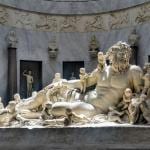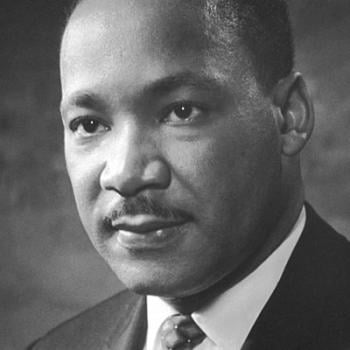
In April 2009, English journalist Edward Luce asked President Barack Obama if he believed in “American exceptionalism.” Obama responded that he did. But he went on to qualify this affirmation: “I believe in American exceptionalism, just as I suspect that the Brits believe in British exceptionalism and the Greeks believe in Greek exceptionalism.” Obama pointed to American sacrifices in the Second World War, American economic and military supremacy, and America’s “core set of values” as signs of America’s “exceptionalism.” At the same time, he admitted that America is imperfect and expressed a willingness to learn from other countries.
James Fallows of the Atlantic, immediately after the close of the press conference, wrote an admiring response praising Obama’s “oratorical performance.” “No one, Yank or otherwise, could fail to be satisfied” with “so balanced a response,” declared Fallows. But he was wrong about that. Sean Hannity accused Obama of “marginaliz[ing] his own country.” James Kirchick argued that Obama had robbed the term of meaning, since logically all countries couldn’t possibly be exceptional.
Obama learned his lesson. Never again would he question American exceptionalism in any way. In fact, he was ironically the first President since 1981 actually to use the term in public, though of course others had expressed the idea in other words. In 2014, he told a West Point audience that he believed in exceptionalism “with every fiber of my being.”
This didn’t stop the Republicans from using the 2009 speech against him. In 2012, Obama’s rival Mitt Romney accused him of not really believing in “American exceptionalism.” In 2015, Bobby Jindal revived the accusation. And of course Obama’s successor, Donald Trump, has conducted his entire campaign and his entire Presidency around the slogan “Make American Great Again.” If Obama tried to nuance American exceptionalism, Trump has stripped it of all subtlety and made a belligerent paraphrase of the concept a battle cry.
“But in England it’s true”
I don’t know about the [modern] Greeks. But Obama was certainly right that there is such a thing as British exceptionalism, though it was more prominent a century ago than it is today. C. S. Lewis, in his excellent discussion of patriotism in The Four Loves, describes a conversation he had on this point with his elderly vicar (p. 26). Lewis pointed out that every nation thinks that its people are superior to others, and the vicar responded in all seriousness: “Yes, but in England it’s true.” Lewis comments, “he could not have been graver if he had been saying the Creed at the altar.”
That is, of course, a rather silly kind of exceptionalism. But many British nationalists expressed it in a more serious ideological form. For some it was a racial claim, that “Anglo-Saxons” are somehow superior to others. But it also took the less noxious (though often closely linked) form of arguing that British institutions of freedom and private property, and the British ethos of honesty and hard work and personal responsibility, made British culture superior. And as Lewis goes on to point out in the Four Loves, this sort of belief often leads one to think that one has the right and responsibility to behave in a superior way toward other cultures. (Lewis was not without nationalistic biases of his own, and probably is if anything too easy on his own country in this regard. But his fundamental point is sound.)
This kind of “Whig” exceptionalism often took an explicitly religious form. Many, beginning at least in the 17th century, argued that divine providence ordained the center of human culture and of “pure” Christianity to move slowly westward. George Herbert expresses this in a particularly dramatic and coherent way in his poem “The Church Militant.” True religion originates in the East, like the sun, and gradually moves Westward through Greece and Rome to Protestant England. Now, Herbert warns: “Religion stands on tiptoe in our land, Readie to passe to the American strand.” When true religion has gone all the way around the earth and come back to the “East” from which it originated, then Jesus will return.
Which exceptionalism?
This kind of explicitly religious Anglo-American exceptionalism lives on in America today in many conservative Christian circles. In 1977, Peter Marshall (son of the famous preacher) and David Manuel published The Light and the Glory, which argues that God has providentially ordained America as a “light to the nations.” This book was very popular in Christian homeschooling circles when I was young.
But outside those circles, American exceptionalism takes more secular forms. Most people trace the origin of the phrase to Alexis de Toqueville, who argued that the Puritan roots of the United States combined with its freedom from the feudal institutions of Europe made it an exception among nations. And there’s no doubt, of course, that the United States as a nation has many unique features. The question is: how far does one generalize this claim of uniqueness, and what are its practical implications?
In his question to Obama, Luce specifically asked whether Obama thought America was “uniquely qualified to lead the world.” In February of 2008, when Obama was still a candidate for the Democratic nomination, Luce had described Obama’s “exceptionalism” in terms of “the belief that America offers a uniquely moral beacon to the world.”
Luce was right, I think, to identify Obama’s rhetoric as a form of American exceptionalism, almost messianic in its tone and implications. The conflict between Obama and his Republican opponents did not concern whether America was exceptional, and perhaps not even why. Both would, if asked, give similar descriptions of American democratic institutions and moral principles. Rather, Obama was arguing in principle for a more persuasive and consensus-building expression of American exceptionalism. He held the United States up as a “moral beacon,” in Luce’s terms, rather than prioritizing American power. (At least in rhetoric. In practice he exerted plenty of coercive power, as in his drone bombing campaign.)
For more hard-nosed exceptionalists, on the other hand, American exceptionalism means first and foremost maintaining American power at a level that cannot possibly be challenged. They want to do this because they believe in America’s moral and cultural “exceptionalism,” to be sure. They believe America is a force for good in the world and that it is therefore in everyone’s interest for America to be supreme. But they do believe in supremacy.
A further difference, well articulated here, is that conservatives locate “exceptionalism” in qualities the United States has historically possessed. Some may fear that their country has lost or is losing those qualities, though they usually claim to believe that it still possesses them more than any other nation does. Progressives, on the other hand, see American “exceptionalism” as consisting primarily in ideals. It is a dream that to a large extent has yet to be realized.
Unfinished symphony
The musical “Hamilton,” which I watched on TV yesterday, exemplifies this kind of “exceptionalism.” At the moment of death, Hamilton cries out ecstatically, “America, you great unfinished symphony.” “Hamilton” is a product of the Obama years–it’s no accident that Miranda first presented the idea at a social event at the White House. It is the imaginative expression of Obama’s vision of American exceptionalism.
Miranda casts white, often slave-owning Founding Fathers as people of color singing rap music. That would be a flaw if “Hamilton” were a historical reenactment. Instead, it’s a kind of prophetic act: a claim by an immigrant of color that these stuffy white men in wigs are his Founding Fathers too. If American exceptionalism can be saved, this is how.
This kind of exceptionalism can conceivably live alongside the recognition of the exceptional qualities of other nations. It’s remarkably similar to Lewis’ concept of the “haunting” of Britain by Logres found at the end of That Hideous Strength. Every nation, Lewis is quick to remind us, has these hauntings of the sordid real by the noble ideal. Every human community is an “unfinished symphony,” a broken gesture at the Good and True and Beautiful.
You have nothing to lose but your self-conceit
In Lewis’ Narnia story The Horse and His Boy, the talking warhorse Bree escapes with his companions from the tyrannical empire of Calormen where he has been held captive for years. After an arduous desert crossing and an encounter with a lion, he finds refuge with the Hermit of the Southern March, but he becomes convinced that he ought to return to Calormen. He has behaved badly when faced with the lion, leaving the other horse and the two humans in order to “save my own wretched skin.”
The Hermit tells him that, in fact, all he has lost is his self-conceit. He’s only had the “dumb” horses of Calormen to compare himself to, and so he’s come to think of himself as something special. In Narnia, he will probably not be very important or remarkable. But, the Hermit tells him kindly, “you’ll be a very decent sort of horse on the whole, taking one thing with another.”
The USA as a nation, it seems to me, is a lot like Bree–including the fact that it’s absorbed a lot of the values of the tyrannical empires against which it typically contrasts itself. (And which, as in Lewis’ book, often owe at least as much to racist fantasy as to reality. The empire you see is the empire you are.) It’s amusing to hear Americans speak as if Britain, for instance, were an absolute monarchy in the 18th century. (“Hamilton” falls into this error to some extent.) In American mythology, the noble Founding Fathers stood up against a world of tyrants and established something brand new. Never mind that there had been city-state republics all over Germany and Italy in the Middle Ages. Never mind the example of the Netherlands. No, the Americans stood up in a world of darkness and brought light. Or so they imagine.
There’s some truth to this, of course. The United States was a remarkable, ground-breaking experiment in republicanism on a large scale. But whatever may have been the case in 1776, today it is one of many essentially democratic nations where orderly transfer of power is the norm and where the rights of minorities are protected. And where, often, social inequalities are less and the poor are less wretched than in the United States.
The United States remains unique, but not always in a good way. The Constitution is a fascinating, remarkable document. But it was the dream of a bunch of 18th-century intellectuals and many elements of it had to be amended almost at once. The provision that the second-highest vote getter becomes the Vice President, for instance, was a disaster because it assumed a level of non-partisan statesmanship that proved completely unrealistic. (There’s a very funny bit about this in “Hamilton.”) Today, most functioning democracies have a “parliamentary” model which on the whole arguably works better without leading to the tyrannical concentration of power the Founding Fathers feared. And of course, that was a model already available to them, which they chose to reject.
One of the fundamental tragedies of America is that Americans are unwilling to accept that perhaps they are just “a fairly decent sort of horse.” Even in this, of course, Americans are not unique. As Lewis said, everyone tends to think that their country is superior. But moral sanity lies in knowing that it isn’t literally true.
The “anti-Americanism” on the left of which conservatives complain is simply the shadow of this. If you expect America to be the Hope of the World, and you find out it’s not, then you are likely to conclude that it’s uniquely evil. The focus on American ill-doing is itself an expression of patriotism. As Chesterton said, if you really love your neighborhood you will tear it down and try to turn it into the New Jerusalem. The exceptionalism of hope is more deeply and fiercely patriotic than the exceptionalism of nostalgia. But it can be terribly destructive too.
The claws of the Lion
What if Americans were willing to free themselves from the messianic dream of “American exceptionalism”? What if they chose to accept that they just happen to be a community of people who live within certain physical boundaries, just as other nations are? That they have many things to be proud of, and many things to be ashamed of, but in the end, to cite Lewis one more time, the only real source of either pride or shame is that we all come from the Lord Adam and the Lady Eve? What if Americans learned to love their ideal, their haunting, without the need to pretend that they have already achieved it? And also, on the left, without pouring hate and scorn on their country for not already having achieved it?
I know that this is, itself, as utopian a dream as any. And I know that if I see clearly on this (which of course I may not) it’s not because I’m any more lacking in self-conceit than anyone else. I was born in England and I’ve never fully felt at home here. I’ve never been willing to undergo what amounts to the religious conversion of becoming an American citizen. (Also, let’s face it, I’m terribly lazy about paperwork.) But as a result I feel perpetually rootless.
So I’m no better than anyone else. I’m as sinful, as broken, as mired in self-conceit. We all are. That’s the point. Mine just happens, for circumstantial reasons, not to be bound up in American nationalism.
The only hope for any of us is the hope that Bree found: the painful but salvific confrontation with the true Lion.












